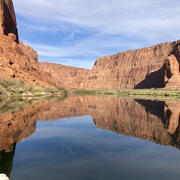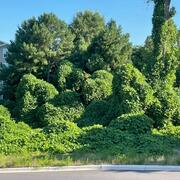Alaska Interior mountain range shot with snow capped mountains.
Shawn L Carter, Ph.D.
Shawn Carter is the Acting Senior Administrator for the Climate Adaptation Science Centers.
Shawn Carter is the Acting Senior Administrator for the Climate Adaptation Science Centers, headquartered in Reston, VA. Shawn has degrees from Cornell, Virginia Tech, and SUNY-ESF and his research interests include ecological monitoring and assessment, forest ecology, and species-habitat relationships.
Education and Certifications
Ph.D. in Forest Ecology, The State University of New York College of Environmental Science and Forestry (SUNY ESF)
M.S. in Wildlife Ecology, Virginia Tech
B.S. in Environmental Studies, Cornell University
Science and Products
Taming wildfires in the context of climate change: The case of the United States Taming wildfires in the context of climate change: The case of the United States
Climate change and the global redistribution of biodiversity: Substantial variation in empirical support for expected range shifts Climate change and the global redistribution of biodiversity: Substantial variation in empirical support for expected range shifts
Unfamiliar territory: Emerging themes for ecological drought research and management Unfamiliar territory: Emerging themes for ecological drought research and management
Do empirical observations support commonly-held climate change range shift hypotheses? A systematic review protocol Do empirical observations support commonly-held climate change range shift hypotheses? A systematic review protocol
Planning for ecological drought: Integrating ecosystem services and vulnerability assessment Planning for ecological drought: Integrating ecosystem services and vulnerability assessment
Hypotheses from recent assessments of climate impacts to biodiversity and ecosystems in the United States Hypotheses from recent assessments of climate impacts to biodiversity and ecosystems in the United States
Ecosystems, Ecosystem Services, and Biodiversity Ecosystems, Ecosystem Services, and Biodiversity
Defining ecological drought for the 21st century Defining ecological drought for the 21st century
USGS integrated drought science USGS integrated drought science
Summarizing components of U.S. Department of the Interior vulnerability assessments to focus climate adaptation planning Summarizing components of U.S. Department of the Interior vulnerability assessments to focus climate adaptation planning
Climate-change impacts on ecological systems: Introduction to a US assessment Climate-change impacts on ecological systems: Introduction to a US assessment
Biodiversity in a changing climate: a synthesis of current and projected trends in the US Biodiversity in a changing climate: a synthesis of current and projected trends in the US
Non-USGS Publications**
**Disclaimer: The views expressed in Non-USGS publications are those of the author and do not represent the views of the USGS, Department of the Interior, or the U.S. Government.
Deep Dive: Managing for the Future of the Colorado River Basin
Deep Dive: Invasive Species in a Changing American Landscape
Deep Dive: Building Resilience to Natural Hazards
Deep Dive: Protecting Critical Infrastructure
Deep Dive: Supporting the Outdoor Recreation Economy
Understanding Changing Climate Variables to Clarify Species’ Exposure and Responses to Changing Environments across North America
Understanding Species' Range Shifts in Response to Climate Change: Results from a Systematic National Review
Webinar: What is Ecological Drought? Exploring Its Impacts on Natural and Cultural Resources
Ecological Drought: Assessing Vulnerability and Developing Solutions for People and Nature
Understanding the Ecological Impacts of Drought Across the U.S.: Regional Workshops and National Synthesis
Webinar: Providing the Science for Natural and Cultural Resource Adaptation to Climate Change
Alaska Interior mountain range shot with snow capped mountains.
Ecological Drought Across the Country Ecological Drought Across the Country
Science and Products
Taming wildfires in the context of climate change: The case of the United States Taming wildfires in the context of climate change: The case of the United States
Climate change and the global redistribution of biodiversity: Substantial variation in empirical support for expected range shifts Climate change and the global redistribution of biodiversity: Substantial variation in empirical support for expected range shifts
Unfamiliar territory: Emerging themes for ecological drought research and management Unfamiliar territory: Emerging themes for ecological drought research and management
Do empirical observations support commonly-held climate change range shift hypotheses? A systematic review protocol Do empirical observations support commonly-held climate change range shift hypotheses? A systematic review protocol
Planning for ecological drought: Integrating ecosystem services and vulnerability assessment Planning for ecological drought: Integrating ecosystem services and vulnerability assessment
Hypotheses from recent assessments of climate impacts to biodiversity and ecosystems in the United States Hypotheses from recent assessments of climate impacts to biodiversity and ecosystems in the United States
Ecosystems, Ecosystem Services, and Biodiversity Ecosystems, Ecosystem Services, and Biodiversity
Defining ecological drought for the 21st century Defining ecological drought for the 21st century
USGS integrated drought science USGS integrated drought science
Summarizing components of U.S. Department of the Interior vulnerability assessments to focus climate adaptation planning Summarizing components of U.S. Department of the Interior vulnerability assessments to focus climate adaptation planning
Climate-change impacts on ecological systems: Introduction to a US assessment Climate-change impacts on ecological systems: Introduction to a US assessment
Biodiversity in a changing climate: a synthesis of current and projected trends in the US Biodiversity in a changing climate: a synthesis of current and projected trends in the US
Non-USGS Publications**
**Disclaimer: The views expressed in Non-USGS publications are those of the author and do not represent the views of the USGS, Department of the Interior, or the U.S. Government.
Deep Dive: Managing for the Future of the Colorado River Basin
Deep Dive: Invasive Species in a Changing American Landscape
Deep Dive: Building Resilience to Natural Hazards
Deep Dive: Protecting Critical Infrastructure
Deep Dive: Supporting the Outdoor Recreation Economy
Understanding Changing Climate Variables to Clarify Species’ Exposure and Responses to Changing Environments across North America
Understanding Species' Range Shifts in Response to Climate Change: Results from a Systematic National Review
Webinar: What is Ecological Drought? Exploring Its Impacts on Natural and Cultural Resources
Ecological Drought: Assessing Vulnerability and Developing Solutions for People and Nature
Understanding the Ecological Impacts of Drought Across the U.S.: Regional Workshops and National Synthesis
Webinar: Providing the Science for Natural and Cultural Resource Adaptation to Climate Change
Alaska Interior mountain range shot with snow capped mountains.
Alaska Interior mountain range shot with snow capped mountains.
















